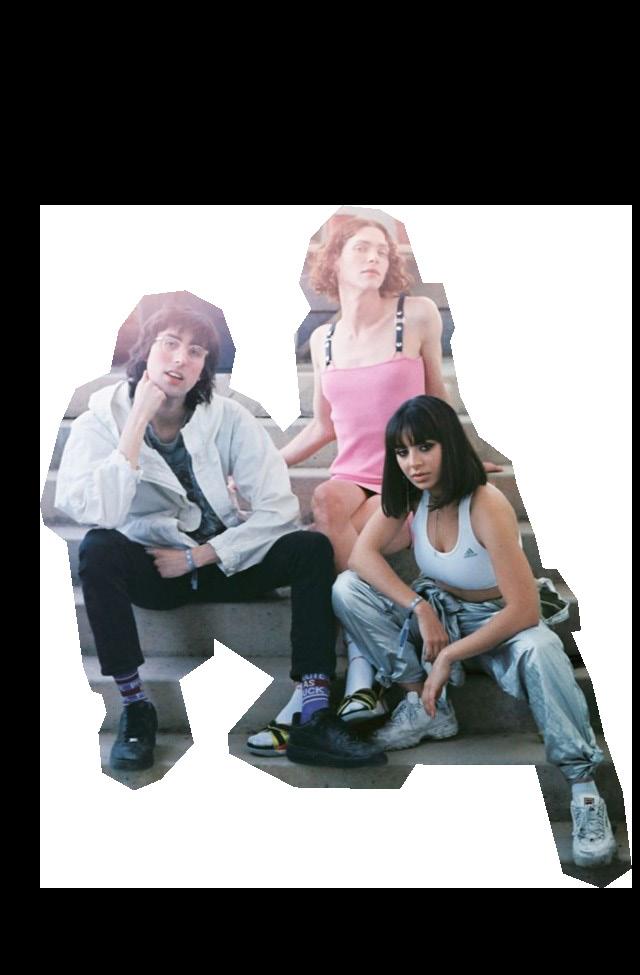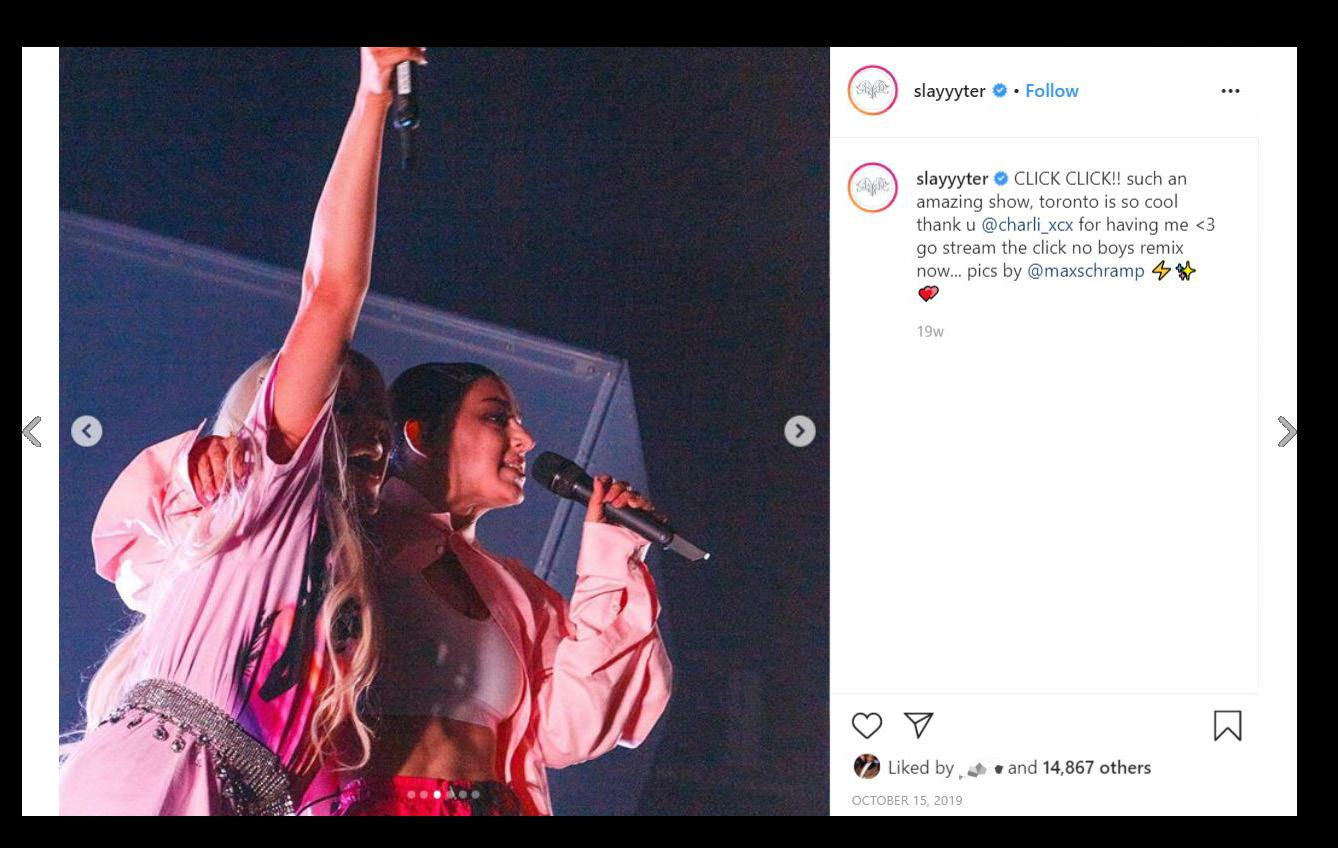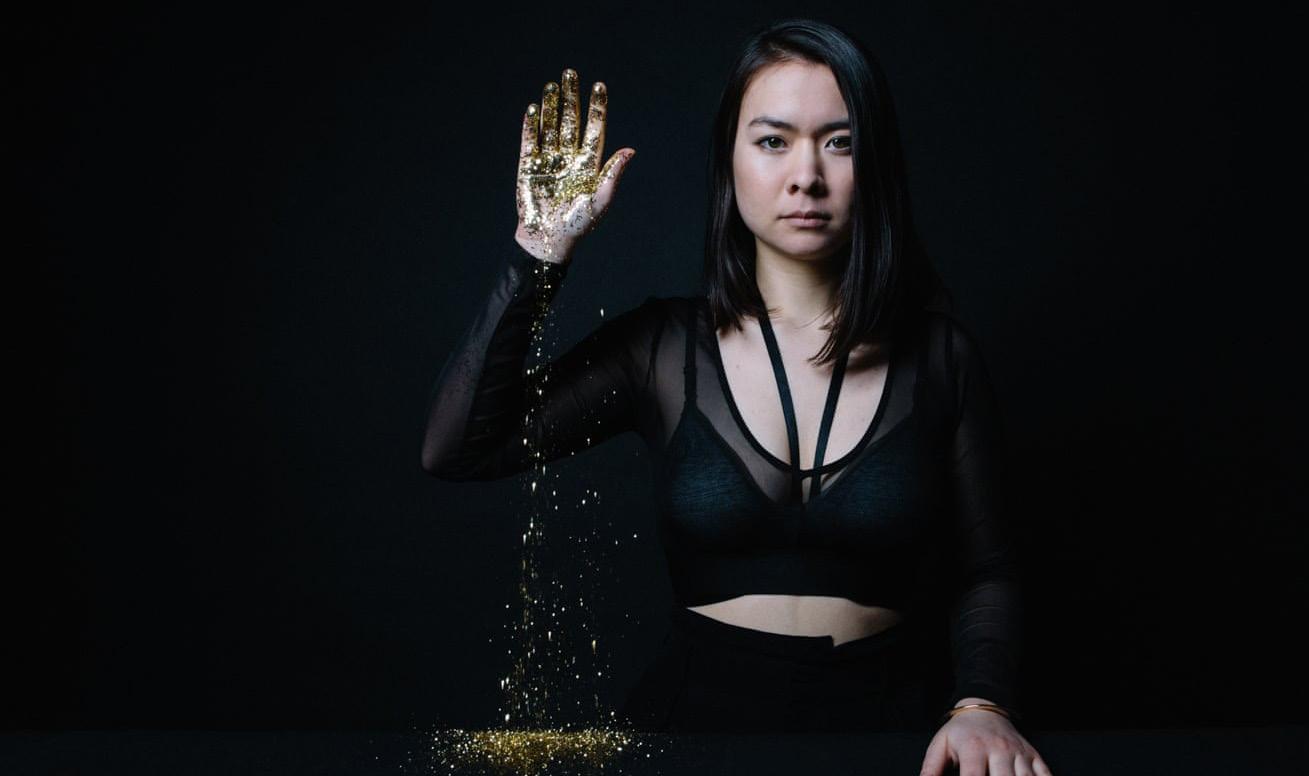
9 minute read
Whole New World
On PC Music and the future of Pop Music
Zain Ahmad
Advertisement
I was first introduced to what would become the future of pop music in 2015. An avid Charli XCX fan, I tuned in to the first episode of her new Beats 1 Radio show, The Candy Shop. Coming off the release of 2014’s Sucker, Charli was set to debut new music, which she had previously described as being “the most pop thing, and the most electronic thing” she had done to date. I had no idea what to expect. Thus far, her music had more or less been palatable, somewhat-alternative skewing pop, and I was inclined to believe that her new stuff would harken back to the sounds from her debut album, True Romance. Boy, was I wrong. The moment I first heard her chant “Let’s ride!” over an industrial sounding beat, I knew that I had entered the future. Over the next two hours, Charli’s show introduced me to the bizarre, sped-up world of PC music, one marked by textured sounds, pitched voices, and an overriding sense of euphoria. I had never heard anything of the sort—sounds clearly mired in early 2000s pop that simultaneously still managed to sound as though they had been beamed in from a distant, sleek future. As she played songs from various new collaborators such as SOPHIE, A.G. Cook, and Hannah Diamond, one thing was certain: I was hooked.
PC Music refers to both a record label and an art collective founded by Alex ‘A.G.’ Cook, a producer who was attending school at Goldsmiths, University of London at the time of its inception. According to Cook, the ‘PC’ in PC Music stands for ‘Personal Computer,’ a term meant to highlight the music’s tendency to sound both incredibly mechanical and intimate. “I was trying to think about how you could make music on the computer that had personality, or felt very intimate or uncanny,” he stated in an interview with Dazed Magazine. “I was burned out on studying and wanted to test these ideas in the real world.”

Photo © Henry Redcliffe
PC Music is notable for its exaggerated take on traditional pop music. The structures inherent to pop are all still there, but they’ve been amplified and distorted to their logical extremes, resulting in highly stylized, textured, yet cartoonishly bubble-gum sounds. In his attempt to push the boundaries of pop music, Cook’s project quickly gained a following and was transformed into a legitimate movement.

The movement has always been one centred on collaboration—the earliest PC Music artists were friends of Cook, such as his childhood friend Danny L. Harle, or singer Hannah Diamond. “The attitude that anyone can make music on a laptop with friends, make one hyper-sleek portrait, and declare themselves a pop star was massively influential on contemporary music,” said Caroline Polachek, a PC-affiliated musician, in the same interview with Dazed. “Except it was genuinely cheeky when PC Music did it, ’cause it was a marketing-themed game, and not game-themed marketing.”
Utilizing shared glossy, sleek visuals to promote themselves as major pop stars, PC Music entered the UK electronic scene. It’s especially interesting to see how various artists with disparate sounds gathered under the PC Music label to promote their shared vision for the future of pop music. No two artists on the label were sonically similar, really. Hannah Diamond’s overwrought pop differed from GFOTY’s parodic electronics, which differed from Life Sim’s simple yet elegant sounds, which differed from Kane West’s four-on-the-floor techno, and so forth. Yet, they utilized a shared aesthetic in order to promote themselves as a collective and gain recognition on a global scale.
As PC Music began to gain traction both within the UK and online, it garnered the attention of music critics who were initially baffled, unsure as to whether they should take the collective as something serious or as a parody piece. “PC Music: the future of pop or ‘contemptuous parody’?” a 2015 headline from The Guardian reads, and a 2014 article from Pitchfork describes it as “one of the freshest, funniest, and most confounding pop-music phenomena to appear in a long time…(a) label capable of absorbing virtually any influence and making it a part of its own warped pop totality”. Major labels soon began to take note as well, and in 2015 the label announced a partnership with Columbia Records. PC Music had transitioned from a collective attempting to parody pop music to a subgenre of its own that now operated within the bounds of the pop machine itself. The fruit of this partnership was relatively short-lived: save for a few modestly popular songs released by Danny L. Harle— one of the first PC artists signed to Columbia— it proved to be difficult to translate the work that PC Music was doing to the context of a major record label. Following a change in Columbia’s management, the label’s partnership ended, and PC Music’s moment in the spotlight ended.
While that signified the end of an era, PC Music had already left a lasting mark on popular culture. Charli XCX brought the collective into mainstream consciousness through her radio show and subsequent collaborations with PC members. Her phenomenal mixtapes released in 2017, Number 1 Angel and Pop 2, were executive produced by Cook and involved several collaborations with other PC members, as well as her third studio album Charli. Meanwhile, SOPHIE, a PCaffiliated artist, released her debut album to critical acclaim, securing a Grammy nomination for Best Electronic Album in the process. Her uniquely textured sounds served as an inspiration for Flume’s latest mixtape, which also had two songs featuring her on it. Post-PC Music, the “hyperpop” genre has taken off, spearheaded by newer, eclectic artists such as 100 gecs and Slayyyter. The PC Music label itself has expanded, adding newer artists to their roster such as 20-year old producer Umru Rothenberg and Swedish singer Namasenda.
“A.G. Cook emailed me, and I thought it was a joke or prank or something,” Umru told me over a Facetime interview. “I got this “@PCmusic email in 2017 or something. He literally just randomly found my stuff on Soundcloud, like browsing through whatever. I don’t know. I still have no idea where he found it.” After being contacted by Cook, Umru was asked to help produce the Charli XCX track I Got It, an explosive, wild ride featuring rappers Cupcakke and Brooke Candy.
“We never really worked on anything until he was in New York for a Charli show – the Number 1 Angel New York show,” Umru recalls. “He invited me to show, and then had me come to a studio with just him somewhere in New York a couple of days later. We worked on I Got It the next time he was in New York, and it was right before the song came out. It was one of the last things that they finished for Pop 2 - he wanted the production to be as intense as possible. And originally, he was going to try and get different people to do the verses - have it totally different each verse. So I was all the stuff I did was produced underneath Cupcakke’s verse, and then he kind of took everything I did and put it all around the track.” Rothenberg’s experience is indicative of just how highly collaborative the production process tends to be in the age of the Internet, where physical distance no longer poses a barrier.
As an artist signed to the PC Music label, Rothenberg is at the forefront of the musical revolution underway in pop. “Less conventional techniques of recording and producing are becoming the norm now,” he says. “People like Charli had been way ahead of everybody with seeking out really experimental and interesting producers – it’s so cool to see everything like that becoming the mainstream.” And indeed, in a post-PC world, ‘hyperpop’ is growing to be the norm with regard to pop music, especially since it’s been intrinsically tied to the internet since the movement’s PC Music beginnings. Apps such as TikTok are helping to propagate this genre of music, propelling artists such as Slayyyter into the spotlight. 100 gecs, an experimental duo consisting of Dylan Brady and Laura Les, had one of the year’s most acclaimed pop releases, and are now collaborating with high-profile artists such as Rico Nasty and Fall Out Boy. And while Charli’s latest album was also her most experimental, it prompted a sold-out international tour. There’s something about highly personal yet artificial, sped-up, loud pop music that appears to be resonating with audiences worldwide.
“Everything for kids now is just faster and more immediate and more, like, in your face,” Umru says. “And just the way that everything else in the world is being thrown at people, you want the music to be as tactile, and right there as possible. Even for people to notice stuff, it needs to stand out in a way that’s very immediate.”
This is the climate that we’re living in in a Post-PC Music world. In the five years since the collective first appeared on the world’s stage, an almost infinite number of possibilities have opened up with regard to the future of pop music. One question remains: where do we go from here?
“I think it’s a hard thing to predict,” says Rothenberg when posed with the question. “It’s both very popular stuff that’s getting increasingly kind of aggressive and fast and loud, and that’s one direction I know that music’s going to keep going, although I don’t even know how much further it can go after stuff like 100 gecs blowing up - that’s literally mainstream now. It’s crazy. I think stuff is going to get more experimental, and that’s just going to become the new norm: more immediate and loud and upfront music. But also I think there’s a whole other side of stuff that’s more bedroom-pop type music. There’s still definitely kind of a sense of familiarity and nostalgia that people want to relate to, and to have much simpler music that’s not about production and how it sounds – more recorded with instruments and everything. I don’t think that’s going to go away in any way. It’s hard to predict anything right now more than ever.”
One thing is for certain: PC Music has opened the gate for pop music to be more self-reflexive, weird, and experimental than ever before. Thinking back on it, I’m taken back to that day in 2015, right before Charli introduced Bip Ling’s wonderfully strange track Bip Burger:“This will split people’s opinion,” she said. “You’re either going to think I’m an idiot, or you’re going to think I’m a genius – obviously, the right answer is genius.”









